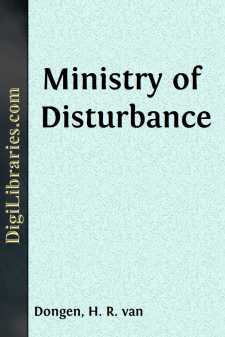Categories
- Antiques & Collectibles 13
- Architecture 36
- Art 48
- Bibles 22
- Biography & Autobiography 813
- Body, Mind & Spirit 142
- Business & Economics 28
- Children's Books 14
- Children's Fiction 11
- Computers 4
- Cooking 94
- Crafts & Hobbies 4
- Drama 346
- Education 46
- Family & Relationships 57
- Fiction 11829
- Games 19
- Gardening 17
- Health & Fitness 34
- History 1377
- House & Home 1
- Humor 147
- Juvenile Fiction 1873
- Juvenile Nonfiction 202
- Language Arts & Disciplines 88
- Law 16
- Literary Collections 686
- Literary Criticism 179
- Mathematics 13
- Medical 41
- Music 40
- Nature 179
- Non-Classifiable 1768
- Performing Arts 7
- Periodicals 1453
- Philosophy 64
- Photography 2
- Poetry 896
- Political Science 203
- Psychology 42
- Reference 154
- Religion 513
- Science 126
- Self-Help 84
- Social Science 81
- Sports & Recreation 34
- Study Aids 3
- Technology & Engineering 59
- Transportation 23
- Travel 463
- True Crime 29
Ministry of Disturbance
by: H. R. van Dongen
Categories:
Description:
Excerpt
Sometimes getting a job is harder than the job after you get it—and sometimes getting out of a job is harder than either!
The symphony was ending, the final triumphant pæan soaring up and up, beyond the limit of audibility. For a moment, after the last notes had gone away, Paul sat motionless, as though some part of him had followed. Then he roused himself and finished his coffee and cigarette, looking out the wide window across the city below—treetops and towers, roofs and domes and arching skyways, busy swarms of aircars glinting in the early sunlight. Not many people cared for João Coelho's music, now, and least of all for the Eighth Symphony. It was the music of another time, a thousand years ago, when the Empire was blazing into being out of the long night and hammering back the Neobarbarians from world after world. Today people found it perturbing.
He smiled faintly at the vacant chair opposite him, and lit another cigarette before putting the breakfast dishes on the serving-robot's tray, and, after a while, realized that the robot was still beside his chair, waiting for dismissal. He gave it an instruction to summon the cleaning robots and sent it away. He could as easily have summoned them himself, or let the guards who would be in checking the room do it for him, but maybe it made a robot feel trusted and important to relay orders to other robots.
Then he smiled again, this time in self-derision. A robot couldn't feel important, or anything else. A robot was nothing but steel and plastic and magnetized tape and photo-micro-positronic circuits, whereas a man—His Imperial Majesty Paul XXII, for instance—was nothing but tissues and cells and colloids and electro-neuronic circuits. There was a difference; anybody knew that. The trouble was that he had never met anybody—which included physicists, biologists, psychologists, psionicists, philosophers and theologians—who could define the difference in satisfactorily exact terms. He watched the robot pivot on its treads and glide away, trailing steam from its coffee pot. It might be silly to treat robots like people, but that wasn't as bad as treating people like robots, an attitude which was becoming entirely too prevalent. If only so many people didn't act like robots!
He crossed to the elevator and stood in front of it until a tiny electroencephalograph inside recognized his distinctive brain-wave pattern. Across the room, another door was popping open in response to the robot's distinctive wave pattern. He stepped inside and flipped a switch—there were still a few things around that had to be manually operated—and the door closed behind him and the elevator gave him an instant's weightlessness as it started to drop forty floors.
When it opened, Captain-General Dorflay of the Household Guard was waiting for him, with a captain and ten privates. General Dorflay was human. The captain and his ten soldiers weren't. They wore helmets, emblazoned with the golden sun and superimposed black cogwheel of the Empire, and red kilts and black ankle boots and weapons belts, and the captain had a narrow gold-laced cape over his shoulders, but for the rest, their bodies were covered with a stiff mat of black hair, and their faces were slightly like terriers'....












